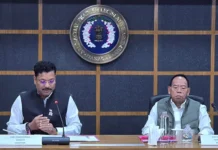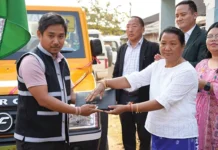[ Samshum Changmi ]
NAMSAI, 18 Jun: The Assam and the Arunachal Pradesh governments have recently engaged in discussions regarding their longstanding border dispute.
The signing of a memorandum of understanding (MoU) marked a significant step towards resolving the conflict that has persisted for several decades. The dispute encompasses 123 villages along their shared 804-km boundary, making it a complex issue to address.
The MoU was signed on 20 April, 2023, with Chief Ministers Himanta Biswa Sarma and Pema Khandu leading the negotiations. The presence of union Home Minister Amit Shah and the then union Law Minister Kiren Rijiju added further significance to the event.
However, despite the agreement reached, there remains dissatisfaction among certain segments of the local population. In particular, the residents of Changlang district have expressed discontent over the terms of the MoU. According to their claim, the MoU did not mention the villages and territories involved in the disputes between Changlang and Tinsukia (Assam) districts.
They further argue that the agreement requires them to relinquish 36 Tangsa villages to Assam, claiming that these villages are an integral part of Arunachal and were wrongfully annexed by Assam. As a result, they have requested Khandu to address their grievances promptly.
Responding to the concerns raised, the CM organised a meeting in Namsai on Saturday. It was attended by several prominent figures, including Deputy Chief Minister Chowna Mein, MP Tapir Gao, Deputy Speaker Taisam Pongte, minister Kamlung Mossang and MLA Phosum Khimhun. Representatives from community-based organisations (CBO), such as the Tirap Changlang Longding People’s Forum (TCLPF) and the All Tangsa Students’ Union (ATSU), were also present.
During the meeting, the TCLPF presented historical evidence in an effort to validate the claims of the villagers of Changlang district. The gathering served as a platform to emphasise the sentiments expressed by the affected villagers, shedding light on the emotional aspect of the matter.
While Khandu has assured the CBOs that he will raise the issue with the Assam government and work diligently towards finding a resolution, the acceptance of the demands made by the organisations remains uncertain.
The Assam-Arunachal border dispute traces its origins back to the colonial era, when certain forested tracts were transferred from Arunachal to Assam in 1951. Subsequently, Arunachal contested this transfer and filed a case in the Supreme Court in 1989. However, due to lack of a final verdict, the dispute has remained unresolved, leading to frequent clashes and violence along the border over the years. (Samshum Changmi is Chief Editor, Eastern Today News Network.)


